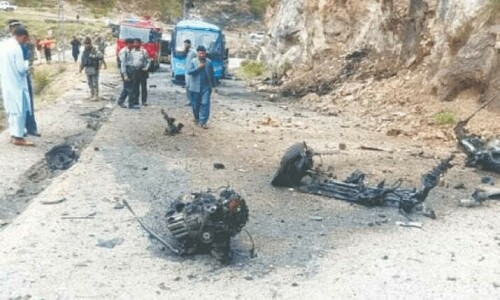THE assassination of Punjab home minister Shuja Khanzada in a suicide attack in Attock is a grim reminder that, recent successes notwithstanding, the war against militancy will be a very long war along the length and breadth of the country and against multiple enemies.
Mr Khanzada’s death is surely a blow to the counterterrorism efforts of the Punjab government. By most accounts, the home minister was an adroit and capable leader and had chalked up a number of successes against militant groups.
It is in the nature of counterterrorism work and policing that the biggest successes are often unknown to the public because success is measured by the absence of violence. Inevitably, there will be questions about how a senior minister, and a frontline figure in the fight against militancy, was left so vulnerable.
Take a look: Punjab loses minister in terrorist attack
As reported in a section of the media, Mr Khanzada’s security was nowhere near as tight nor along the lines of what standard procedure demanded. It appears that perhaps Mr Khanzada himself preferred to visit his hometown to meet with constituents without onerous security.
Therein lies the problem of weak systems and institutions. In a more evolved system, the security of public officials would be determined independently of the individuals who are to be protected; such decisions would be made by professionals and would be final.
Culturally, however, the deference offered to superiors and powerful individuals means professional opinion is sometimes overridden. It remains to be seen if that is indeed what happened with Mr Khanzada, leaving him — and others — open to a devastating attack.
Standard operating procedure should be revisited in any case because the state has lost a capable leader and many families have lost their relatives. Fighting the war against militancy is a constant reminder that while the defenders have to fail just once, the enemy has to succeed only once.
Beyond the immediate tragedy, there is the issue of how widespread militancy has become and how far the reach of militants is. In the Attock attack, there is confirmation of what independent observers have long warned: the myth of south Punjab being the sole hotbed of militancy in the province needs to be laid to rest.
Urban Punjab, central and northern Punjab, indeed areas in other provinces not usually associated with militancy, have all become zones in which the militants are able to hide and operate.
To root out those elements, it will take much more than raids and so-called intelligence-based operations. The state is still not any closer to understanding why militancy continues to attract new converts.
Simply capturing or killing generations of militants is not enough. The emphasis needs to switch to ensuring there is no next generation being indoctrinated.
That alone would do justice to the legacy of Shuja Khanzada and the countless others who have died over the past decade.
Published in Dawn, August 18th, 2015
On a mobile phone? Get the Dawn Mobile App: Apple Store | Google Play










































